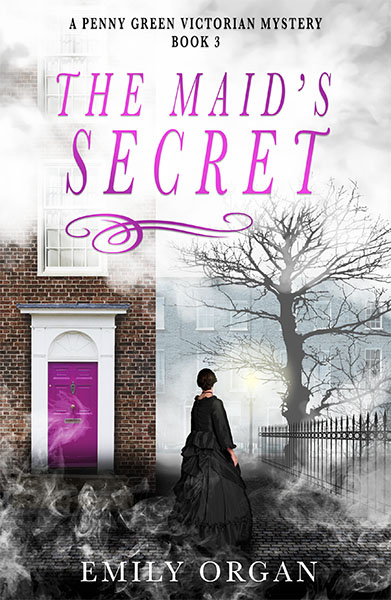
All was going well until someone put cyanide in the champagne…
Having proven her sleuthing skills, news reporter Penny Green is tasked with spying on a Victorian industrialist in his South Kensington home. Forced to work undercover as a maid, Penny’s unsure if she’ll be able to pull it off.
When a young woman is poisoned during a party at the house, Penny’s work becomes a murder investigation. Her insider knowledge is crucial for Scotland Yard’s dashing Inspector James Blakely.
Events escalate after a second mysterious death. Penny uncovers a tangled web of relationships which complicate the investigation. But time is running out. Can she solve the mystery before her cover is blown?
The Maid’s Secret is book 3 in the Penny Green Victorian Mystery Series by Emily Organ. Available as ebook, paperback, hardback and audiobook. Free to read with Kindle Unlimited.
Book 1 – Limelight
Book 2 – The Rookery
Book 3 – The Maid’s Secret
Book 4 – The Inventor
Book 5 – Curse of the Poppy
Book 6 – The Bermondsey Poisoner
Book 7 – An Unwelcome Guest
Book 8 – Death at the Workhouse
Book 9 – The Gang of St Bride’s
Book 10 – Murder in Ratcliffe
Book 11 – The Egyptian Mystery
Book 12 – The Camden Spiritualist
Read an excerpt from The Maid's Secret “Mr John Morrison?” I asked. The tall, dark-skinned man beside me nodded, and I wrote his name down in my notebook. John looked to be about twenty. His brow was crumpled and he kept loosening his necktie, as though it would help him breathe. “I’m supposed to be at work,” he said. “I’m sure your employer will understand on a day like today,” I replied. “I don’t know about that.” He pulled at his tie again. “Elizabeth Wiggins was your sister?” I asked. “Yes.” His voice cracked with emotion. “I’m so sorry,” I said. “Thank you for agreeing to talk to me. I know this must be extremely difficult for you.” We were standing on Gonsalva Road in Battersea: a drab street lined on both sides by cramped, brown-brick houses. Number sixteen looked just like all the others, aside from the police officer trying to keep onlookers away from the front door. A light drizzle fell, leaving small sparkling raindrops on my woollen jacket. Trains rumbled along the viaduct behind the houses, and the damp pages of my notebook tore beneath my pencil. A small crowd had filled the street. Men stood with hands in their pockets and dirty-faced children chased each other around, while women holding babies shouted at them. “What can you tell me about your sister?” I asked. “What sort of person was she?” John wiped his brow with his hand. “I can’t get used to that word was. I can’t believe she’s not here no more. I only saw her yesterday! She’s kind-hearted, like. She’d do anything for anyone. She worked north of the river ’til she lost her job. She’s a hard worker, she is. I’ll miss her. My wife and son’ll miss her too.” He quickly rubbed the tears from his eyes to prevent me from seeing them. “And what of your brother-in-law?” I asked. “Had he ever harmed Elizabeth before?” “No. I don’t think he did, anyway. She never told me so. The policeman told me he was drunk. He didn’t usually drink much. Mrs O’Donnell says she heard shouting. They must have argued, I suppose. Elizabeth would’ve been angry on account of him being drunk. She didn’t like drinkers, our Elizabeth. Because of our father, that is. Me and her saw what drink does to a family. He must have lost his temper with her. He wouldn’t normally have done it, but it was the drink. And now…” John wiped his hand over his face. “He’s ruined everything!” I wrote down what he had told me in shorthand. “The police are holding him now. He’ll face trial,” I said. “And so he should! I hope he hangs!” “John Morrison!” a voice called out from behind me. I turned to see Tom Clifford from The Holborn Gazette approaching with his pencil and notebook. His jaw moved up and down as he chewed on a piece of tobacco. “How old was your sister?” “I’m not speaking to no more reporters now,” said John tremulously. “I have to get back to me wife. She’s in a delicate state, she is.” “Of course,” I said. “Thank you for your time, Mr Morrison.” “Only speakin’ to Miss Green, are yer?” Tom Clifford taunted as John walked away. “Leave him be,” I said. “His sister has just been murdered.” “What did ’e tell you?” “That’s none of your business!” Tom Clifford spat out a globule of tobacco. “You won’t of got much from the likes of ’im. What can you say about a battered wife? Husband comes home in a foul temper, husband beats wife, wife dies, and husband gets hanged for it. Happens every week. What we need is another killer like we had in St Giles. How’s about that, Miss Green? It’s a bit more exciting, ain’t it? Sells newspapers, that kinda thing.” “It’s not about excitement, Mr Clifford. We’re reporting on real people’s lives. I don’t wish to report on murders in order to sensationalise them. I do it to pay my respects to the victims. Mrs Wiggins should be remembered.” Tom Clifford cackled. “You ’ave a nobler cause than the rest of us, don’t yer, Miss Green?” I ignored him and noted down the date and time at the top of my page: Tuesday, 4th March, 1884. Ten o’clock. I folded my notebook closed, put it into my carpet bag and took out my umbrella, while Tom Clifford walked over to the police officer and began questioning him. Reporting on domestic tragedies such as these was upsetting. The death of a woman at the hands of her partner should have been avoidable, and sadly it happened far too often. I wiped the raindrops from my spectacles, opened my umbrella and walked down to Wandsworth Road, where I could take the horse tram up to Westminster Bridge.
